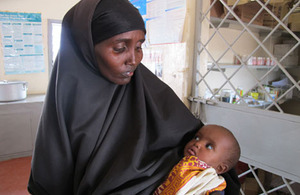Protecting the vulnerable in Kenya
How UK aid is helping malnourished children and their mothers as part of the response to the humanitarian crisis in the Horn of Africa

Amina holds her nine-month-old baby, Hamdi. Picture: David Orr/WFP
As part of the response to the humanitarian crisis in the Horn of Africa, Britain is helping over 200,000 people in Kenya who have been affected by the drought through UNICEF and the World Food Programme. The majority of UK funds are targeting children - preventing malnutrition, providing supplementary feeding to those severely & moderately malnourished, feeding children under 5 as well as pregnant and breastfeeding mothers.
This is in addition to the safe water, food and basic healthcare being delivered to 130,000 refugees in the Dadaab camp.
Providing essential rations
WFP have been able to respond quickly to the crisis and start distribution of food and nutrtional rations through their partner health centres across the worst-affected areas of Northen Kenya.
At one of the health centres, in Shanta’abaq, near Garissa in north-eastern Kenya, Amina sits waiting with tiny Hamdi in her arms. Her family have lost nearly all their sheep and goats in the drought. “I’ve got 8 children”, she says, “the trouble is, we no longer have enough meat or milk to feed them. That’s why little Hamdi is sick.”
Simon Gichuiki, a nurse at the centre, puts a tape measure around the Hamdi’s upper arm to calculate its circumference. This helps health workers determine if a child is malnourished and how serious his or her condition is. Simon finds that Hamdi’s arm is only 9.5cms in circumference. “This child is 9 months old,” he says, “but weighs only 4.5kgs. This is a case of severe acute malnutrition.”
A backdrop of drought
In Shanta’abaq it has not rained since March 2010. As the drought has got steadily worse the number of children being brought to health centres like this one has increased. By July 2011, around 15% of the children in Shanta’abaq were suffering from malnutrition.
Across Kenya 3.2 million people are food insecure, thousands of livestock have died, crops have been lost and rains have failed in many parts of the country. All this against a backdrop of escalating food and oil prices. Such is the extent of the disaster that it is expected to continue beyond the start of the short rains season in October.
How UK aid will help
Children suffering from severe malnutrition, like Hamdi, are treated with theraputic food such as plumynut, which has a high energy content and adequate amounts of vitamins and minerals. But investing in prevention is crucial.
By treating children with moderate malnutrition, WFP tries to prevent them from slipping into severe malnutrition. In many emergency settings, for every child suffering from severe acute malnutrition, there are 8 or 10 suffering from moderate malnutrition.
British aid means that over the next 5 months WFP can provide 115,400 malnourished under-threes and breast-feeding women, like Amina and Hamdi, with a food ration of Corn-Soya Blend and vegetable oil. The ingredients make up a protein-rich fortified porridge that provides children with the essential nutrients that they need. In addition, 92,300 moderatly acutely malnourished children under the age of five will be given foods that will specifically meet their own unique needs.
Malnourished children are not just at risk due to a lack of food and water - they are also extremely susceptible to killer diseases, including measles, malaria, diarrhoea and pneumonia. That is why UK aid is also being used to provide Vitamin A supplements and vital immunisations alongside the food distribution.
UK aid will continue to be focused on providing support to children like Hamdi, as one child to die from hunger is one child too many.
Facts and stats
UK aid has provided £5 million to WFP Kenya to provide this essential support across six districts: Turkana, Mandera, Wajir, Marsabit, Samburu and Isiolo. The six districts will be reviewed after 2011 Short Rains expected in October and November 2011.
UK aid has provided £3.2 million to UNICEF, working in 13 districts: Turkana, West Pokot, Samburu, BAringo, Laikipia, Isiolo, Marsabit, Moyale, Tana River, Garissa, Mandera, Wajir and Ijara.
Britain is providing lifesaving aid for over two million people across Ethiopia, Kenya and Somalia in response to the crisis in the Horn of Africa